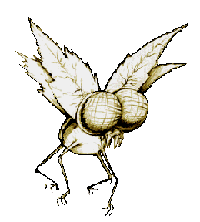The fly effect: Russian scientists invent new medicine with the help of flies
 The researchers of St. Petersburg State University's entomology laboratory are now working on antiviral and antineoplastic drugs that are to make a revolution in the world pharmacology
The researchers of St. Petersburg State University's entomology laboratory are now working on antiviral and antineoplastic drugs that are to make a revolution in the world pharmacology
New unique medicines are based on the immune system of insects, which means that their formula is relies on Mother Nature itself.
Since time immemorial people noticed that even the seemingly most harmless insects could both kill and heal humans. Hunters knew that an arrow smeared with the gold-beetle's poison could kill a giraffe. Not only exotic insects are able to secrete poisonous substances. A good example is the ladybird that is so common in Russia. Water solutions of ladybird's blood plasma sometimes cause dermatitis in humans. Oriental medicine used wingless females of cockroaches to treat sex glands' disorders while in Russian traditional medicine black-beetles were used as a urinative. Hardly anybody will resort to such medical treatment nowadays. Nevertheless, there are certain facts indicating that insects can provide a unique way of treating diseases.
Why did pharmacologists suddenly start paying their attention at insects? As it turns out, in some millions of years these small creeping and flying creatures succeeded in settling the Earth so well that they have become the largest group of living beings. The progressive evolution of insects is connected with the development of different systems of organs, including the immune system. Insects have worked out simple and effective mechanisms of identifying and destroying pathogenic bacteria. Their immune system is very different from that of humans. Still it is as effective (and sometimes even more effective) as the human immune system. Insects can quickly identify bacteria with the help of receptor molecules and synthesize albuminous compounds – peptides – in return. The only thing is to learn how to use them. At the moment entomologists – scientists that study insects – know about two million species of insects. This means that thanks to the substances that can be extracted from the insects experts will obtain millions of new compounds that possess high bioactivity.
Nowadays scientists know many antibacterial antibiotics that are synthesized by insects. Unlike other invertebrates they start synthesizing them only when there is an infection in the organism. It is in some way similar to the adaptive immunity of people. However, insects' system is much simpler. Insects have a so-called adipose body that is similar to mammals' liver. When there is an infection in the body the adipose body throws out about 15 different peptides that together destroy the bacteria. This is where the phenomenon of high antibacterial effectiveness comes from.
The results of the research conducted by the St. Petersburg scientists showed that the immune reaction of the insects is often controlled by the neuroendocrinal system. One of the most interesting discoveries made by the Russian researchers is that about the role of brain in regulating synthesis of peptides by the adipose body cells. As it turned out insect's brain is able to transform stress signals into stimuli that emerge as an immune reaction to the infection. As a result, studying the immunity mechanisms of insects is an effective tool to solve the fundamental problems in different spheres of biology and medicine.
Scientists from St.Petersburgdiscoveredthatoneofthestrongesttherapeuticeffectsisthatproducedbysomeoftheflymaggots.Theheadoftheresearch Sergey Chernysh says: “During the wars with Napoleon it was noticed that soldiers left on the battlefields died of blood poisoning but not if they had the maggots in their wounds. They were healed because the maggots were eating the dead tissue while secreting a certain recuperating ferment. They saturated the wound with certain antibiotics that facilitated the quick healing. Famous Russian surgeon Pirogov used the maggots during the Crimean War. They saved thousands of lives during the World War I as well”.
This method of medical treatment did not become popular because of a certain difficulty of growing these maggots and a risk of infection. Still, in some Swiss and American hospitals maggots are used for treating such diseases as trophic ulcer or osteomyelitis.
In order to extract the components that prevent bacteria from growing Russian scientists had to study insects' immune system thoroughly in the first place. “As a result we discovered several kinds of albuminous compounds that have a very high antibacterial activity. Besides, the research has proven that maggots have unique substances that are not only able to kill bacteria but can also make the immune system fight virus infection”, Sergey Chernysh claims.
Scientists tried out new biotechnologies on mice infected with influenza virus for this purpose. Mice that were injected peptides extracted from maggots got well quickly. As a result scientists received a prototype of the substance that could create a therapeutic effect in the organism. The next step was to turn it into a medicine. “An injection based on the peptide allopheron-1 was created to treat herpes and hepatitis B. Once in the patient's blood the substance finds those cells that are infected with virus. The mechanism of this medication is very different from those that are used nowadays. It stimulates the identification of the virus antigens”.
Experts from the Immunology Institute of the Russian Ministry of Health, The Virology Institute of the Russian Academy of Medical Sciences and Moscow Medical Academy of I.M. Sechenov evaluated the results of research as very high. The head of the Center of Preventive Medicine, Natalia Safronnikova says: “The new medicines turned out to be more effective in treating herpes than the other antibiotics and what is more important that led to a quick general recovery. After studying the immune system of the patients that were treated we discovered that the therapeutical effect of the new medicines made the organism fight the infection all by itself”.
St. Petersburg scientists went as far as creating medicine for treating skin and mucosa viral infections. New medicine also has antineoplastic properties. “This medicine is unique as it is based on the substance that cannot be found in the human immune system”, Safronnikova says. Scientists say that they are not going to extract the needed compounds from insects' organism anymore. It will be much cheaper and simpler to synthesize them.
Decoding the mechanism of immune reaction is not only one of the main scientific problems. It can also broaden the horizons in fighting different human, animal and plant infections. Most of such opportunities are still waiting to be put into practice. However, they encourage scientists to study cell and molecular mechanism of the insects' immune system. Looks like the first practical results are not far off.
Stepan Krivosheev
Discuss this article on Pravda.Ru English Forum
Subscribe to Pravda.Ru Telegram channel, Facebook, RSS!



